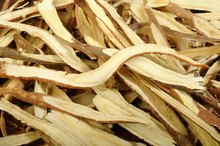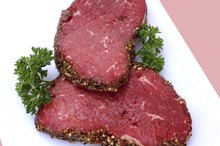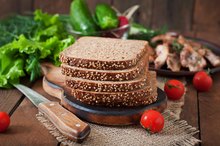What does fact checked mean?
At Healthfully, we strive to deliver objective content that is accurate and up-to-date. Our team periodically reviews articles in order to ensure content quality. The sources cited below consist of evidence from peer-reviewed journals, prominent medical organizations, academic associations, and government data.
The information contained on this site is for informational purposes only, and should not be used as a substitute for the advice of a professional health care provider. Please check with the appropriate physician regarding health questions and concerns. Although we strive to deliver accurate and up-to-date information, no guarantee to that effect is made.
Levothyroxine & High Fiber Diet
The thyroid gland is responsible for the production of significant hormones that regulate the majority of metabolic functions like breaking down food into usable nutrients. Some people develop thyroid conditions that prevent proper production of the thyroid hormones. In this event, the synthetic hormone levothyroxine is used to replace the low producing hormone so your body can still function normally 2. As with any medication there are precautions and a high-fiber diet is one that may interfere in the proper absorption of levothyroxine 2.
Thyroid Gland and Levothyroxine
The pituitary gland at the base of your brain produces thyroid-stimulating hormone, or TSH, which travels in the bloodstream to your thyroid gland. The TSH communicates to the thyroid to produce the hormones tri-iodothyronine, or T3, and thyroxine, or T4. Damage to the thyroid or pituitary gland from varying causes like gland inflammation or autoimmune disease can hinder the production of T4 hormone resulting in an underactive thyroid condition including hypothyroidism, goiter or Hashimoto's disease. If physician testing reveals you have an underactive thyroid, he may recommend a prescription-strength thyroxine medication called levothyroxine 2.
- The pituitary gland at the base of your brain produces thyroid-stimulating hormone, or TSH, which travels in the bloodstream to your thyroid gland.
- Damage to the thyroid or pituitary gland from varying causes like gland inflammation or autoimmune disease can hinder the production of T4 hormone resulting in an underactive thyroid condition including hypothyroidism, goiter or Hashimoto's disease.
Levothyroxine Information
Side Effects of Deglycyrrhizinated Licorice
Learn More
Underactive thyroid, especially in the case of hypothyroidism, likely requires life-long treatment with levothyroxine 2. Proper use of this medication is imperative to maintain healthy thyroid function; your physician monitors this with annual lab testing to determine if the medication dose needs adjustment. Take levothyroxine on an empty stomach with a full glass of water so it properly absorbs in your body 2. If you consume certain foods, like fibrous grains or produce, or take supplements containing calcium or iron, at the same time as levothyroxine, absorption is impaired, nullifying its therapeutic effects on the thyroid 2. You should avoid supplements and high-fiber foods for several hours before and after you take levothyroxine 2.
High-Fiber Diet
Fiber is the indigestible portion of plant-based foods. It serves a variety of important functions including maintenance of digestive and bowel health, nourishing the good bacteria that reside in your colon and helping to keep your cholesterol levels low. The daily recommendation for fiber ranges from 25 to 35 g and should come from a variety of food sources. A food with 5 g or more of fiber per serving is designated as high-fiber. Whole grains like all bran or wheat products can contain 5 to 8 g of fiber per serving. Legumes, including lima, navy, black or pinto beans, have 5 to 7.5 g of fiber per serving. Fruit and vegetable varieties like pears, blackberries, potatoes and squash also have 5 to 7 g of fiber per serving.
- Fiber is the indigestible portion of plant-based foods.
- A food with 5 g or more of fiber per serving is designated as high-fiber.
Daily Fiber and Levothyroxine
How to Take Synthroid & Whey Protein Together
Learn More
When taking levothyroxine, you do not have to avoid fiber-filled foods in your daily diet, but you may have to adjust the time of day you consume them 2. In addition to fresh produce and grains, packaged foods may also contain fiber. Read nutrition labels to determine the amount of fiber per serving. Consult your physician for dietary recommendations and follow your prescription instructions for best results.
- When taking levothyroxine, you do not have to avoid fiber-filled foods in your daily diet, but you may have to adjust the time of day you consume them 2.
Related Articles
References
- MayoClinic.com; Levothyroxine (Oral Route); Micromedex; November 1, 2010
- Peace Health; Levothyroxine; 2009
- McAninch EA, Bianco AC. The History and Future of Treatment of Hypothyroidism. Ann Intern Med. 2016;164(1):50–56. doi:10.7326/M15-1799
- Jonklaas J. Persistent hypothyroid symptoms in a patient with a normal thyroid stimulating hormone level. Curr Opin Endocrinol Diabetes Obes. 2017;24(5):356–363. doi:10.1097/MED.0000000000000355
- Peterson SJ, Cappola AR, Castro MR, et al. An Online Survey of Hypothyroid Patients Demonstrates Prominent Dissatisfaction. Thyroid. 2018;28(6):707-721. doi:10.1089/thy.2017.0681
- Hoang TD, Olsen CH, Mai VQ, Clyde PW, Shakir MK. Desiccated thyroid extract compared with levothyroxine in the treatment of hypothyroidism: a randomized, double-blind, crossover study. J Clin Endocrinol Metab. 2013;98(5):1982-90. doi:10.1210/jc.2012-4107
- Grozinsky-glasberg S, Fraser A, Nahshoni E, Weizman A, Leibovici L. Thyroxine-triiodothyronine combination therapy versus thyroxine monotherapy for clinical hypothyroidism: meta-analysis of randomized controlled trials. J Clin Endocrinol Metab. 2006;91(7):2592-9. doi:10.1210/jc.2006-0448
- Allergan. Armour Thyroid Helpful Resources.
- Bahn R, Burch H, Cooper D, et al. Hyperthyroidism and other Causes of Thyrotoxicosis: Management Guidelines of the American Thyroid Association and American Association of Clinical Endocrinoloigists. Endocrine Practice. 2011;17(3):456-520. doi:10.4158/ep.17.3.456.
Writer Bio
Aubri John has been a contributing researcher and writer to online physical and mental health oriented journals since 2005. John publishes online health and fitness articles that coincide with her licensed clinical skills in addictions, psychology and medical care. She has a master's degree in clinical social work and a Ph.D. in health psychology.









